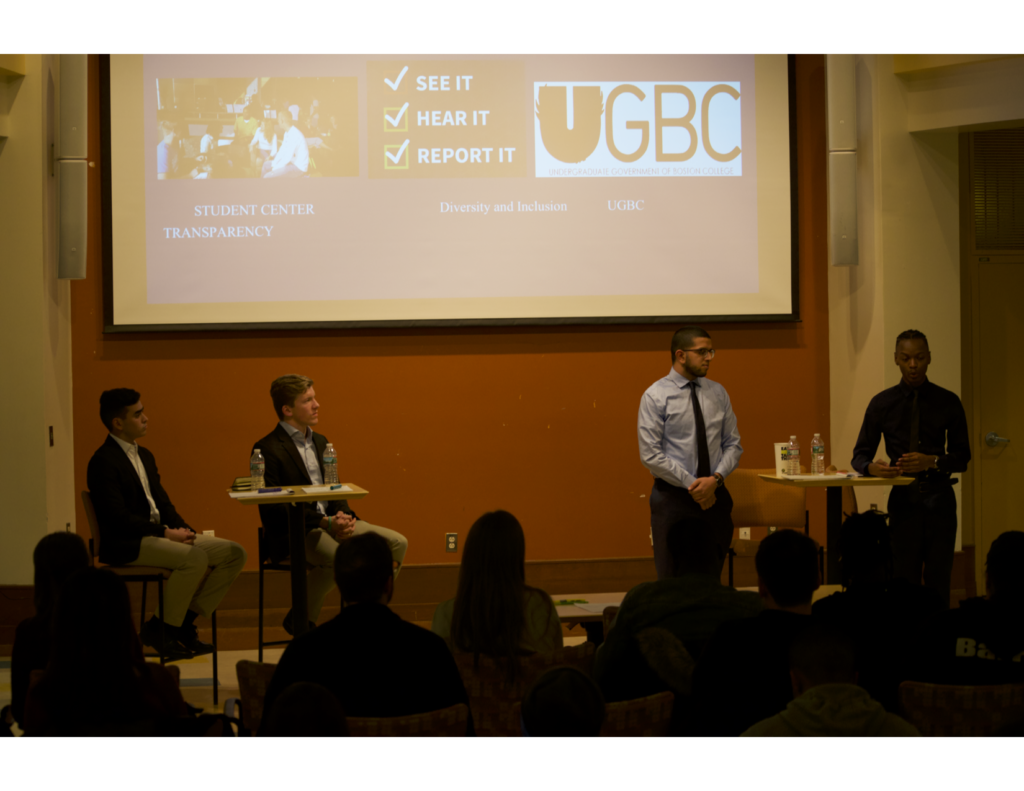The two teams running for Undergraduate Government of Boston College president and executive vice president presented key points of their platforms Monday evening at an election kickoff event.
Two teams are officially in this year’s race: Taraun Frontis, CSOM ’19, and Aneeb Sheikh, MCAS ’20; and Reed Piercey, MCAS ’19, and Ignacio Fletcher, MCAS ’20. Each team was given the chance to introduce itself and then present their platform, though only Piercey and Fletcher had their full campaign platform published at press time.
Piercey and Fletcher, who spoke first, said their mission is to compel the administration to create a campus culture of “challenge and change” due to the initiatives in their platform, which is founded upon the pillars of advocacy, reliability, and engagement. Regarding advocacy, Piercey said their first priority is to expand and deepen all advocacy initiatives for marginalized communities at BC.
He specifically argued that they will address racial discrimination by increasing collaboration between UGBC and on-campus anti-racist groups, such as the AHANA Caucus, working with the administration to increase BC’s faculty of color, and having counselors on campus to deal with issues of diversity.
“Given what happened last semester with regard to the racist incidents on campus, effective and challenging advocacy is more crucial now than ever,” Piercey said.
Furthermore, he laid out a plans that benefit other members of the community, such as having a higher quantity of Eagle Escorts on campus for disabled students and building a LGBTQ+ resource center. Fletcher then addressed religious diversity on campus, and the lack of places to worship for non-Catholic-identifying students, while arguing for an increase in the number of spaces for worship around BC.
They also discussed renewing UGBC’s focus on tangible day-to-day improvements in student life and fostering more communication between the student body and the administration. One proposal was for an Eagle Exchange Program, which would allow students to purchase used items at a reduced price or receive them as a donation. Piercey argued that this would create greater accessibility to resources for economically disadvantaged students. Fletcher also suggested assigning senators from the Student Assembly to a specific residence hall, who would act as a direct line of communication for that hall’s residents.
“We need to expand the UGBC wings to represent the whole student body,” Fletcher said.
Frontis and Sheikh have a three-part platform focused on building a student center, diversity and inclusion, and UGBC transparency. On the Google form with which they collected the 250 signatures needed to participate in the race, they allowed students to share their ideas surrounding what they would want from UGBC. They received significant input.
“We got [in the range of] 150 to 200 responses, and we built our platform from the voices of the students,” Sheikh said.
One primary response appeared to be the lack of a student center on campus. Out of the top 30 universities in the country, BC is the only one without a dedicated student center, Sheikh said. He outlined three pressing needs for the implementation of one: a lack of space for club meetings and events; a lack of non-academic or non-dining hall spaces to talk about issues; and a need for space for various entities, such as a LGBTQ+ resource center and University Counselling Services.
Sheikh said that he and Frontis would “actively” and “aggressively” pursue this policy through various methods, such as a t-shirt and merchandise campaign and consistently bringing the topic up in meetings with administrators.
“We are also going to encourage students and alumni not to donate to BC until BC puts in place a tangible and opaque plan to build a student center,” he said.
He and Frontis both spoke on the pressing need to make advocacy improvements on campus and highlighted their qualifications for doing so. Sheikh sponsored a resolution on the “Muslim Ban” last year, as well as a resolution in response to the racist incidents in Roncalli this year. Frontis, as the council chair of the AHANA+ Leadership Council, argued he has gained the “executive experience to turn words into action and to make tangible change.” The teammates, along with others, also took part in advocating during the Silence is Still Violence march in October, helped to create a cultural competency module for the incoming freshman class, and negotiated a bias incident reporting form on Agora Portal. They hope to expand upon this reporting if elected.
Frontis also described his experience with marginalization on campus.
“As a queer person of color on this campus, I found it really uncomfortable for me to exist on campus at one point in time, and I wasn’t able to make BC my home,” Frontis said.
But he then said that through open dialogue and tough conversations, he developed relationships with the administration and student body, ultimately finding his home at BC.
The team also hopes to make UGBC more tangible and transparent to everyone by passing a public relations resolution to publish resolutions online and have voting records made public. Frontis also hopes to make it possible to get more involved with the organization.
“We have been in all communities on campus … and we’ve done well establishing relationships with the administration,” Sheikh said.
The Elections Committee is hosting a debate on diversity and inclusion tonight, as well as a final debate on Feb. 11. Voting will take place on Feb. 15.
Featured Image by Amelie Trieu / Heights Senior Staff



















